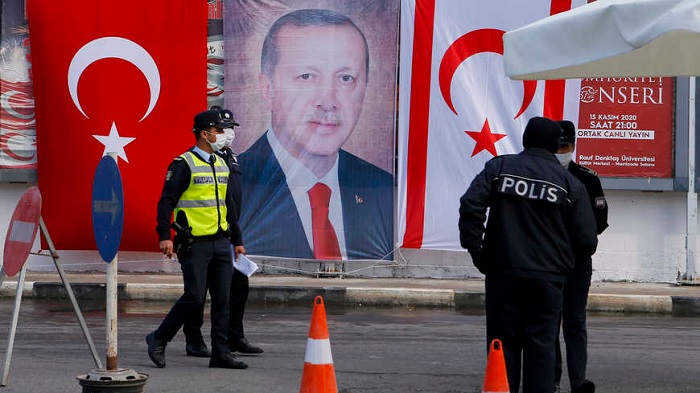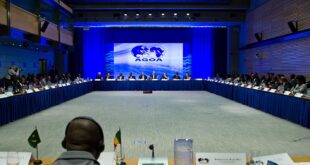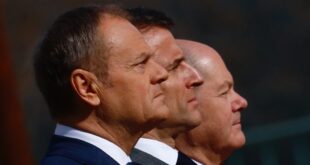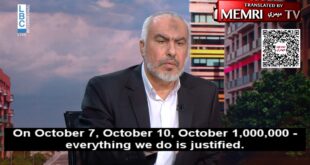
Speaking during a visit to Northern Cyprus, Recep Tayyip Erdogan said Turkey would continue drilling in contested waters around Cyprus and the Greek islands “until a fair settlement” was reached.
Turkish President Recep Tayyip Erdogan’s call Sunday for a two-state solution for the divided island of Cyprus and vow for Turkey to continue drilling for hydrocarbons in the Eastern Mediterranean has sparked fresh controversy and poured cold water over excited chatter of a “reset” in Ankara’s relations with the West.
Speaking on the 37th anniversary of the declaration of independence of the breakaway Turkish Republic of Northern Cyprus, recognized solely by Turkey, Erdogan insisted that a two-state solution for the Mediterranean island needed to be negotiated “on the basis of sovereign equality” because there are “two separate peoples and states” on the island. Erdogan, who traveled to Northern Cyprus with his informal coalition partner, far-right leader Devlet Bahceli, added that Turkey would continue drilling in contested waters around Cyprus and the Greek islands “until a fair settlement” was reached.
Turkey’s deployment of drill ships escorted by Turkish navy frigates to the Eastern Mediterranean has escalated tensions with Athens and the internationally recognized government of the Republic of Cyprus, and prompted sharp rebukes from Washington and the European Union. The EU has threatened to impose sanctions on Ankara unless it pulls out the ships. It is set to weigh such action during an EU summit that is due to be held in December. Erdogan’s comments suggest he doesn’t take the threats seriously, and history has borne him out so far.
Erdogan’s talk of a two-state solution, however, ought to be treated seriously, warned Mustafa Akinci, the moderate former president of the self-styled Turkish Republic, on his Facebook page. “One of the states will be the Republic of Cyprus run by the Greek Cypriots; the other will be the Republic of Turkey on which Northern Cyprus will become even more dependent,” he contended. Akinci appeared to be suggesting that Ankara’s control over the north would become total and complete.
“Without a doubt, the Greek administration’s responsibility for this [outcome] is great. [However], the most disturbing aspect [of this outcome] is that it has not been embraced by the Turkish Cypriot people,” he wrote, alluding to presidential elections held last month that were narrowly won by Ersin Tatar, a hard-liner who backs a two-state formula. Akinci alleged that Tatar won thanks to Ankara’s intervention. Akinci’s claim has been bolstered by reports of voter fraud and threats of deportation of mainland settlers who refused to back Tatar.
In a rare display of defiance, Turkish Cypriot demonstrators protested Erdogan’s decision to make a stop at the beach resort of Varosha “for a picnic” during his Cyprus tour. The ghost town was meant to be a bargaining chip in a deal to reunite Cyprus. But it was opened only three days ahead of the presidential polls in a bid to mobilize nationalist support for Tatar. Others read it as a signal that Turkey, which has 30,000 troops on the island, may no longer be interested in a settlement.
Once a booming coastal resort, Varosha has remained shuttered ever since Turkish troops occupied the northern third of the island in 1974 in response to an attempt by the Greek Cypriots to annex the island to Greece.
Greek Cypriot President Nicos Anastasiades angrily denounced the move as a flagrant violation of UN resolutions, which call for Varosha to be placed under UN administration.
Turkish Foreign Minister Mevlut Cavusoglu insisted, however, that only the beach had been reopened and that all private property was being left untouched.
UN-facilitated talks to unify the island have made no headway. The EU’s decision to admit Cyprus in 2004 in the absence of a settlement, despite Erdogan’s push for one at the time, has made things harder and left the island’s native Turkish population ever more dependent on Turkey.
Many feel that over four decades of diplomatic isolation and Islamic conservatism, carried from the Turkish mainland by tens of thousands of Turkish settlers, have submerged their determinedly secular culture, while successive Turkish governments have hijacked their future to advance Ankara’s own interests.
Still, some analysts contend, Erdogan’s remarks may be more posturing intended to wrest maximum concessions at the bargaining table once peace talks resume. “But it would be a mistake to not take it as a very serious threat that could unfold fast very fast, before [US President-elect Joe] Biden is installed, with Turkey’s allies starting to recognize the Turkish Republic of Northern Cyprus,” Fiona Mullen, director of Sapienta Economics Ltd, a consultancy based on the Greek-held side, told Al-Monitor.
Harry Tzimitras, director of Peace Research Institute Oslo’s Cyprus Center, concurred.
“President Erdogan’s assertions should not be summarily dismissed. Turkey always announces future policy steps and then proceeds with their materialization,” he told Al-Monitor in emailed comments.
“Turkey’s actions and its president’s statements do not come out of the blue, but are a result of the failure of the peace process in Crans Montana in the summer of 2017,” he said. Tzimitras was alluding to the last round of Cyprus peace talks that were held at the Swiss skiing resort.
“At that time and ever since, Turkey has said that that was the last time the model of bizonal bicommunal federation was discussed and that it would be proceeding with Plan B, arguably in the form of what we see today. This is also the outcome of Turkey’s belief that it was as constructive as possible at that last conference and that Ankara is not to be blamed for its failure,” he added.
Democratic presidential nominee Biden’s victory has, nonetheless, spurred widespread speculation that Erdogan will shift course in the knowledge that the new president is unlikely to display the magnanimity of the incumbent, Donald Trump, who has shielded Ankara from congressional sanctions over its acquisition of Russian S-400 missiles. This in turn might embolden the EU to get tougher with Ankara as well.
But Erdogan’s latest comments suggest that talk of a reset was premature or just plain wishful thinking. At a minimum, Turkey’s drilling activities in the Eastern Mediterranean are likely to continue just as Erdogan vowed, because “they have to do with a power projection that Turkey attempts in the broader East Mediterranean region” and “should be understood within the changing regional geopolitical dynamics and the role that Turkey aspires to play in the wider region,” Tzimitras said.
It may also be that Erdogan’s idea of a reset is quite different than that envisaged by Turkey’s Western allies.
Nicholas Danforth, a non-resident senior fellow at the Hellenic Foundation for European and Foreign Policy, said, “Erdogan has always been eager for a reset with the West on his own terms. What’s absent from the current discussion is any concrete evidence he’d consider any of the concessions that would make a real reset possible.” These would include mothballing the S-400s and freeing high-profile prisoners of conscience such as philanthropist Osman Kavala.
“Talking about a two-state solution in Cyprus and pushing ahead with exploration in the East Med are the exact opposite of the steps that would be needed to rebuild relations,” he told Al-Monitor.
“All this talk of a reset already seemed to involve Ankara rehashing old arguments and repeating old offers. Piling on fresh provocations definitely isn’t going to bring anyone in Washington around,” Danforth concluded.
 Eurasia Press & News
Eurasia Press & News



